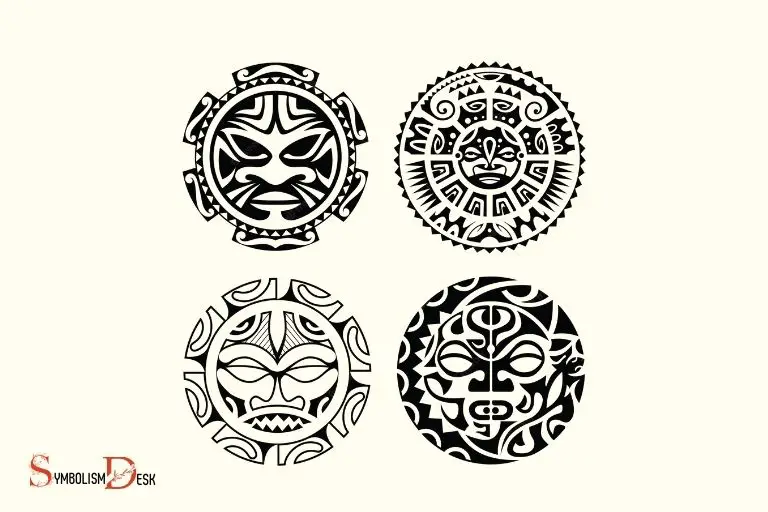What Do Polynesian Tattoo Symbols Mean? War!
Polynesian tattoo symbols carry a variety of meanings that are deeply rooted in the culture and history of Polynesian islands.
These symbols often represent elements from nature, war, and societal roles, among others.
Each symbol has a precise meaning, and when combined, these symbols tell a story or convey a specific message about the wearer’s identity, genealogy, or personal characteristics.
Polynesian tattoo symbols originate from the Polynesian islands, a large group of over 1,000 islands scattered over the central and southern Pacific Ocean.
These symbols are heavily influenced by Polynesian culture, mythology, and traditions.
For instance, some symbols represent gods or sacred animals, while others signify love, courage, or status. The placement of these symbols on the body also holds significance in Polynesian tradition.
Polynesian tattoo symbols are more than just body art – they carry deep cultural significance and have been used for centuries to express personal identity, status, and beliefs. Whether it’s the Enata symbolizing relationships, the Shark Teeth representing protection, or
10 Meanings of Polynesian Tattoo Symbols
| Symbol | Meaning |
|---|---|
| Enata | Enata symbolizes people and are frequently used to represent members of one’s family or ancestors. |
| Turtle | The turtle or ‘Honu’ signifies good health, peace, long life, and the navigator. |
| Shark Teeth | It is a symbol of shelter, guidance, adaptability, and power. |
| Ocean | Ocean symbolizes the source of life, and it’s considered a place where humans originate and return after death. |
| Tiki | Tiki is a symbol of protection and often represents Polynesian gods. |
| Marquesan Cross | It stands for balance and harmony, and often used in Polynesian tattooing. |
| Sun | The Sun symbolizes leadership, grandness, riches and renaissance. |
| Gecko | It symbolizes fear and illness, but also considered as a sign of protection. |
| Spear Heads | Spear Heads are a symbol of strength, courage, and warrior-like qualities. |
| Sea Shell | Sea shells often signify protection, intimacy and shield. |
Key Takeaway

Five Facts About: Polynesian Tattoo Symbols
The Cultural Significance Of Polynesian Tattoos
Polynesian tattoos hold a fascinating and rich history that’s hard to miss.
A staple of polynesian culture, tattoos have been used to convey a wide range of meanings throughout history ranging from tribal identification to medicinal purposes.
The Significance Of Tattoos In Polynesian Culture
Polynesians traditions have a deep appreciation for tattoos, which have been used in cultural ceremonies and events to signify one’s rank, accomplishments, and social status.
In polynesian culture, tattoos are seen as more than just ink on skin; they are a way of life.
Polynesian Tattooing As A Way To Preserve History And Traditions
Polynesian tattoos possess a rich history of traditional designs that are techniques passed down from generation to generation.
These designs have been used to tell stories, portray the connection between humans and nature, or to pay tribute to their deities.
The Role Of Tattoos In Polynesian Mythology
Polynesian tattoos hold great significance in mythology, as they are often used to depict powerful deities and rituals.
Mythical figures, like the shark, octopus, and lizard, are often incorporated into polynesian tattoos to represent their connection to the gods they believe in, and to pay homage to their ancestors.
As a result, tattoos are viewed as a sacred symbol in polynesian culture, enhancing their sense of identity and pride.
Polynesian tattoos are more than just an expression of artistic ability. They represent deep cultural reverence and traditional practices that have been carried on across generations.
With that said, polynesian tattooing artistry should always be conducted with respect for customs and cultural traditions.
Polynesian Tattoo Symbols: A Visual Vocabulary
Polynesian tattoos have been around for centuries and are still popular today due to their intricate designs and deep meanings.
These tattoos use shapes and patterns to tell a story and represent important aspects of polynesian culture.
In this section, we will discuss popular polynesian tattoo symbols, the meaning behind their shapes and patterns, and the significance of animals and mythological figures in polynesian tattooing. For example, the turtle symbolizes health, fertility, and long life in Polynesian culture, while the tiki represents the first man and is considered to bring protection and good luck. Animals such as sharks and rays are also commonly incorporated into Polynesian tattoos, with each carrying its own symbolism and significance. Additionally, mythological figures like Maui, the demigod who pulled up the islands from the sea, often appear in Polynesian tattoo designs, adding a layer of cultural storytelling to the artwork. Christmas symbolism explained includes the use of festive colors, such as red and green, to represent the holiday season and the use of evergreen trees to symbolize eternal life.
Popular Polynesian Tattoo Symbols And Their Meanings
Polynesian tattoos are made up of various shapes and patterns, and each one has a unique meaning.
Here is a list of popular polynesian symbols and their meanings:
- Enata: A human-like figure representing ancestors and family.
- Honu: A sea turtle representing longevity, peace, and good luck.
- Tiki: A deity or semi-god representing protection and fertility.
- Marquesan cross: A cross with curved edges representing balance and harmony.
- Spearheads: Representing courage, strength, and fighting skills.
- Sun: Representing prosperity and leadership.
- Shark teeth: Representing power, adaptability, and protection.
Understanding The Meaning Behind Polynesian Shapes And Patterns
Polynesian tattoos use a variety of shapes and patterns to create their designs.
Here is an explanation of some of the most common ones:
- Triangles: Representing family, harmony, and protection.
- Circles: Representing eternity and unity.
- Lines: Representing connections and pathways.
- Waves: Representing life and change.
- Spirals: Representing regeneration and growth.
When combined, these shapes and patterns tell a story and represent important aspects of life, such as family, nature, and spirituality.
The Significance Of Animals And Mythological Figures In Polynesian Tattooing
Polynesian tattoos often feature animals and mythological figures, each with their own meaning.
Here are a few examples:
- Hammerhead shark: Representing a navigator and safe passage across water.
- Lizard: Representing good luck and protection.
- Octopus: Representing adaptability and intelligence.
- Manaia: A creature combining a bird’s head, fish body, and human legs representing a guardian.
These animals and mythological figures add depth and meaning to polynesian tattoos, connecting the designs to the natural world and spiritual realm.
Polynesian tattoo symbols are not just beautiful designs, but a visual vocabulary telling stories and representing important aspects of polynesian culture.
By understanding the meaning behind these shapes and patterns, we can appreciate the depth and significance of these tattoos.
Polynesian Tattoos As Personal Expression
Tattoos have always been a form of expression. In ancient times, polynesian tattoos symbolized social rank, family ties, and spiritual beliefs.
Today, individuals get inked for various reasons, but for many, polynesian tattooing is still seen as an act of personal expression.
In this section, we’ll explore how polynesian tattoos act as a form of personal expression.
The Role Of Individuality In Polynesian Tattooing
Contrary to popular belief, polynesian tattoos are not standardized designs. Each tattoo is unique to the individual and tells a personal story.
The tattoo artist works with the client to design a custom tattoo that reflects their personality, values, and experiences.
This ensures that no two polynesian tattoos are the same, adding to the value of personal expression.
How Polynesian Tattoos Can Tell A Personal Story
The motifs used in polynesian tattooing hold significant meaning. The symbols, such as turtles, waves, and birds, are drawn together to tell a story that represents an individual’s cultural and personal history.
The tattoos serve as a visual memoir, marking significant milestones and events in their lives.
Polynesian tattooing also demonstrates a sense of belonging, where the wearer can honor their cultural roots.
The Symbolism Behind Placement And Size In Polynesian Tattooing
In polynesian tattooing, size and placement play a crucial role in the overall message the individual is communicating.
For instance, tattoos that cover the arm or back tend to symbolize life’s struggles, personal triumphs, and achievements.
In contrast, smaller tattoos are more discreet and often have a hidden meaning, acting as a personal reminder for the wearer.
In polynesian culture, tattoos were placed on specific body parts to reflect social rank.
In modern times, the placement of the tattoo is based on personal preference, but many still honor the tradition by placing tattoos on specific body parts.
Polynesian tattoos are not just pieces of ink on skin; they hold significant meaning, reflect personal history, and embody cultural heritage.
They are a form of personal expression and symbolism, where the wearer has complete control over the design, placement, and size of the tattoo.
Polynesian Tattoos Today: Revitalization And Contemporary Meaning
The emergence of globalized tattooing has led to polynesian tattoos receiving a worldwide audience.
Nowadays, polynesian tattooing represents more than just a work of art on someone’s skin; it is a symbol of cultural identity and expression.
Let’s dive deeper into how polynesian tattooing has been revitalized and the contemporary meaning behind it today.
The Decline Of Polynesian Tattooing And Cultural Revitalization Efforts
Polynesian tattoos experienced a period of decline due to colonization, christianization and the transition to western culture.
However, in recent times, cultural revitalization efforts have led to a resurgence in traditional polynesian tattooing.
Here are some key points about the reasons behind the decline of polynesian tattooing and the cultural revitalization efforts:
- Polynesian tattooing declined due to changes in culture and religion.
- Many traditional tattoo artists died without passing their knowledge to the younger generation.
- The revitalization of polynesian tattooing began in the 1980s when a group of artists and cultural practitioners started to revive traditional tattooing.
- Today, there is a renewed appreciation for the cultural significance and heritage of polynesian tattooing.
The Contemporary Meaning Of Polynesian Tattooing In A Globalized Context
Young pacific islanders today see polynesian tattooing as a way to express their cultural identity. However, polynesian tattoos have also become popular in other parts of the world.
Here are some key points about the contemporary meaning of polynesian tattooing in a globalized context:
- Polynesian tattoos are now regarded as art and cultural symbols in many parts of the world.
- They represent courage, strength, and respect for ancestors.
- Many people choose to have a polynesian tattoo design because they are drawn to the aesthetic qualities of the art form.
- Polynesian tattooing has become a way of promoting and preserving the pacific island culture.
- The cultural significance of polynesian tattoos is now recognized and valued throughout the world.
Polynesian tattooing is not just about the art of tattooing, but it is also a symbol of cultural expression and identity.
The revitalization of polynesian tattooing has brought about a renewed appreciation for the cultural heritage of the pacific islanders.
The contemporary meaning of polynesian tattoos has expanded beyond its traditional roots, and it is now recognized and valued worldwide.
What Does the Mute Symbol Mean in Polynesian Tattoo Culture?
The mute symbol meaning on instagram direct is not inherently connected to Polynesian tattoo culture. However, in Polynesian tattoo culture, symbols carry significance and tell stories. Each symbol holds its own meaning, often representing important aspects of life such as strength, family, or spirituality. The mute symbol, typically a crossed-out speaker, indicates silence or soundlessness in the digital realm rather than a specific representation in Polynesian tattoo culture.
FAQ About What Do Polynesian Tattoo Symbols Mean
What Are The Most Common Polynesian Tattoo Symbols?
The most common polynesian tattoo symbols include sharks, sea turtles, and spearheads. Other popular symbols are sun, waves and birds.
What Is The Meaning Behind Shark Tattoos In Polynesian Culture?
In polynesian culture, shark tattoos symbolize protection, guidance, and power. It is also a symbol of adaptability.
What Do Sea Turtle Tattoos Represent In Polynesian Culture?
Sea turtle tattoos in polynesian culture represent longevity, peace, and spiritual connection. It also represents the importance of environment.
What Is The Significance Of Spearhead Tattoos In Polynesian Culture?
Spearhead tattoos in polynesian culture represent courage, strength, and the ability to overcome challenges. It also symbolizes leadership.
What Is The Meaning Of Bird Tattoos In Polynesian Culture?
Bird tattoos in polynesian culture symbolize freedom, knowledge, and communication. It is also often associated with gods and messengers.
Conclusion
Tattoos hold a significant and cultural importance in the polynesian society, representing various aspects of their unique culture.
They are not just aesthetic art pieces, but deep-rooted symbols of their beliefs, values, and traditions. The polynesian tattoo symbols carry a hidden meaning, and each design represents a unique story behind it.
The spiritual significance of the tattoos is evident through their intricate designs, and they are a sacred art form for the polynesian people.
Today, people worldwide have adopted the polynesian tattoo designs to express themselves and their beliefs, but it’s essential to understand their historical and cultural significance.
The polynesian tattoos are more than just stunning body art, and it’s crucial to get them inked with respect, knowledge, and appreciation.
The polynesian tattoo symbols hold a sacred meaning and represent the vibrant and rich culture of polynesia, and it’s vital to acknowledge and respect their cultural significance.






